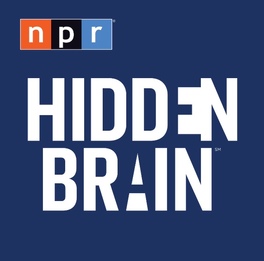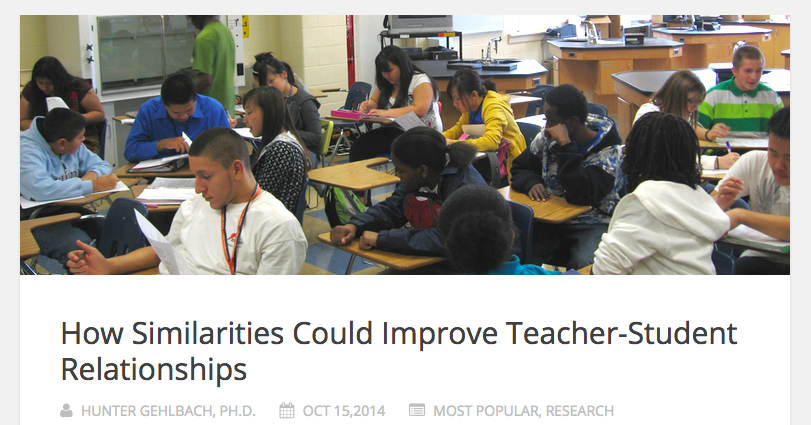A thoughtful study for all the right reasons To start off my blog today, I'd like to ask any educator reading this post to think of some of their hard to reach students, the ones who may be disengaged and performing below expectations in your subject area. Whatever it is you teach, I ask you to really reflect upon these struggling students and keep them in mind as you read further. As educators, we all strive to have a positive, lasting impact on the students that we teach. However, there is a lot involved in this process and by no means is it an easy task. It is common to see massive differences in the abilities and skills of our students in regards to the learning outcomes that they are expected to meet in our programs. How we address these differences requires us to highly personalize our delivery in order to maximize the impact that we can have on student learning which means that the relationships formed with them truly matters. I'm saying something here that seems sooooo obvious, but when we really begin to dissect the relationships that we form with our students, what are some of the factors that matter the most? When looking back at our own experiences in school, what is it that we remember most? Do we remember the different units we studied, essays we were told to write, or passing/failing grades? I barely remember any of these things. What I recall the most is the connections that I had with my teachers and how these connections made me feel. There were some teachers who had no idea who I was as a person, what I thought or how I felt. They didn't know anything about my likes or dislikes and certainly weren't interested in investing the time or energy to find out. I'm certainly not crying 'poor me' here as I know every single teacher reading this blog has very similar experiences in regards to the relationships and connections that they had with their teachers. I was lucky to have some excellent teachers in my time, ones who made me want to learn and show up consistently. I wasn't an A student across the board, but definitely did well in their classes. I'm an avid listener of podcasts and recently came across a great episode in the Hidden Brain NPR show. I've been listening to the Hidden Brain the last few months and always find takeaway value that can be applied to the work that I do. The host, Shankar Vedantum, did one show on the impact of student-teacher relationships on learning and shared a very thoughtful study on this theme carried out by Dr. Hunter Gehlbach and his team of researchers at the Harvard Graduate School of Education.
Let me state that this was just one study in one school and was focused on adolescents at the year 9 level, so it is impossible to make sweeping generalizations that profess absolute truth. It is critical to not blindly take studies such as this at face value. However in saying this, I'd like to challenge you to consider the research and think about to what extent there are shreds of truth within it. The Study at a Glimpse: Dr. Hunter and his group created "get-to-know-you" surveys aimed at identifying personal preferences such as favorite hobbies, charities you would support, characteristics of a good friend, and other types of questions that help to better understand both teachers and students. These surveys were given to 315 ninth grade students and 25 teachers. The research team had a deep look at these surveys which allowed them to really dig deep with identifying potential similarities between the students and their teachers. A week after the surveys were given, both students and teachers were split up into 4 different groups. 1) No feedback from the surveys given to either the teachers or the students. 2) Feedback from surveys given to only the teachers. 3) Feedback from surveys given to only the students. 4) Feedback given to both the students and the teachers. Both students and teachers from group 4 were informed of certain similarities that they had in common with one another. At the end of the term, grades were gathered and researchers came to the conclusion that there was a 60% decrease in the achievement gap between the under-served and over-served when compared to the other study groups. In this case, the under-served were considered to be Black and Latino students. The analyses of this study draws attention to the idea that if there is a stronger connection between student and teacher, the historically under-served will perform better in the classroom. Again, this is just one study in one school with one group of students. It is impossible to assume that the findings are accurate and if the intervention actually works in different school settings across all subject areas. What interests me is the idea of the under-served and over-served. Who are the under-served in your program? In looking at my own subject area of physical education, are the under-served the students who are unfit, not athletic, disengaged and on the fringes? What would happen if I was to conduct a survey with my own students at the beginning of the year that assisted me in narrowing in on similarities between myself and my students. Will knowing these similarities impact the relationships that I have with my students? Conversely, how will my students be impacted by knowing these similarities? Will these similarities serve as an entry point to build upon and strengthen the connection that I have with each of my students? Let's extend it even further and think about how a similar study might even benefit levels of productivity in the workplace in regards to administrator-teacher and teacher-teacher relationships? Will knowing one another better help us to have higher levels of well-being that ultimately impacts the effectiveness of our teaching? Despite not being able to draw firm conclusions from Dr. Hunter's research, at minimum I think that this study should get us thinking about the relationships that we have with our students and what can be done to better connect with them in an effort to maximize the impact that we can potentially have on their learning. I personally think that it is worth the effort and time. What do you think? Thanks for reading.
7 Comments
Justin
2/5/2016 03:53:23 am
Students won't care to learn until they learn u care? It only makes sense that students who feel connected to the teacher will be more engaged. The opposite is true as well. Teachers who understand their students will make personal connections to the learning. If I know a student likes the hunger games I can refer to those movies to make my content really stick. The final part of this may be that when we can identify with students and vice versa our reaction to each other may be more humane and gentle.
Reply
Jin Bu
2/25/2016 08:47:05 pm
I think that this video is very sad. It teaches me that when something bad things happen, we need to brave and face the hardships.
Reply
4/15/2016 10:09:32 am
here is a site that really gives <a href="http://free-psncodesonline.com/">free psn codes</a> this works for sure
Reply
2/16/2018 06:06:05 am
we are happy to comment here, and we await your komantar in our blog
Reply
2/16/2018 06:07:29 am
a pride for me to be able to discuss on a quality website because I just learned to make an article on
Reply
8/17/2018 10:21:57 pm
kandungan dengan cepat dan akurat terbukti ampuh untuk melunturkan janin kehamilan muda 1 minggu hingga 1 , 2 , 3 dan 4 bulan
Reply
6/18/2020 07:30:08 pm
I thank you for the information and articles you provided http://carakandunganhaid.com/
Reply
Leave a Reply. |
AuthorKAUST Faculty, Pedagogical Coach. Presenter & Workshop Leader.IB Educator. #RunYourLife podcast host. Archives
September 2022
|
- Welcome
- All Things Teaching and Learning
- The Aligned Leader Blog
- Consulting and Coaching Opportunities
- My TED X Talk
- My Leadership Blog
- Run Your Life Podcast Series
- How PYP PE with Andy Has Helped Others
- Good Teaching is L.I.F.E
- The Sportfolio
- Example Assessment Tasks
- PYP Attitude Posters (printable)
- Publications

 RSS Feed
RSS Feed
